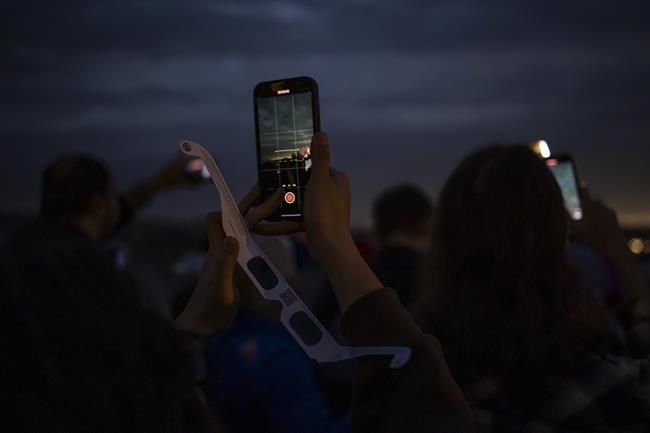TORONTO — Canada's two largest mobile carriers say bolstered capacity measures helped their networks handle the extra wireless traffic in hot-spot regions where tens of thousands of people gathered to take in Monday's total solar eclipse.
СŔ¶ĘÓƵE Inc. said its Bell network saw five times the regular volume of traffic in areas including Niagara, Hamilton, Toronto, Montreal, Sherbrooke, Brockville, Kingston and Quebec City.
"Thanks to the measures we had put in place ahead of time, our network continued to run optimally," СŔ¶ĘÓƵE spokeswoman Jacqueline Michelis said in a statement.
Rogers Communications Inc. said it saw record-breaking amounts of traffic in communities along the path of totality.
The company said that compared with volumes recorded on Monday, March 25 — which it used as a benchmark — it processed five times more 5G data on the day of the eclipse.
The City of Niagara Falls and Town of Niagara-on-the-Lake had both warned about the possibility of spotty cellphone or internet service on the day of the eclipse if the influx of tourists were to overwhelm the system.
The former, which was expecting up to one million visitors for the event, had advised local businesses that some may see urgent requests to use their landline phones if cell service went down. There was also a risk that ATMs operating over Wi-Fi could have lost function if cellular traffic overwhelmed the system.
Rogers said its network usage increased eightfold in Montreal, by six times in Niagara Falls, and doubled in Kingston.
During totality, Rogers customers sent triple the amount of texts with photos or videos compared with average volumes.
"This was a once-in-a-lifetime experience and our network team worked around the clock to handle the increase in wireless traffic, ensuring Canadians stayed connected to share the moment," Rogers spokeswoman Laura Crochetiere said in an emailed statement.
To prepare for that added pressure, Bell and Rogers each deployed portable mobile towers known as Cell on Wheels, or COWs, to increase capacity.
Michelis said Bell had a dedicated team monitoring usage levels throughout the day. Crochetiere added Rogers implemented "special event configurations" to adjust the coverage and traffic management at certain cell sites.
Telus Corp. said last week it did not need to deploy Cell on Wheels, touting network investments in recent years that would already allow it to offer the capacity needed.
"Our infrastructure was able to support the increased number of visitors during the eclipse," said a statement from spokeswoman Jacinthe Beaulieu, noting Telus saw five times its regular volume of data traffic and nine times the voice calls in areas such as Niagara, Hamilton, Toronto, Montreal, Sherbrooke, Brockville, Kingston and Quebec City.
All three companies said their technical teams paused routine maintenance work that could have reduced service levels.
"Our team worked around the clock ... and duly monitored our network performance to provide continuity of service so our customers could enjoy this once-in-a-lifetime event," said Beaulieu.
Last week, Quebecor Inc. said it was confident its network would also hold up, noting the total eclipse route would include viewing sites scattered over a relatively large area, thus reducing the risk of network congestion.
But it cautioned "temporary slowdowns" were possible if larger-than-expected crowds gathered in those areas.
"Our teams monitored the situation closely all the way through the eclipse. We observed a traffic increase of up to 50 per cent on our network in areas where larger crowds gathered," the company said in an unattributed statement on Tuesday.
"The strength and robustness of our network ensured continuity of wireless service for all Videotron, Freedom Mobile and Fizz subscribers during yesterday's eclipse."
This report by The Canadian Press was first published April 9, 2024.
Companies in this story: (TSX:RCI.B, TSX:СŔ¶ĘÓƵE, TSX:T, TSX:QBR.B)
Sammy Hudes, The Canadian Press




